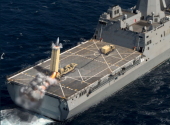If China does not wipe out US forces from Japan and Guam, then America does not need to be flying B-52s from Tindal to attack Spratley. It can attack China from Guam or even bases in Japan. If China looks like it's losing, then even South Korea and Philippines could be compelled to join us to assist US efforts. Indonesian neutrality is basically irrelevant at that point. And yes, I do expect Indonesia to side with America if China is losing. Nobody wants to be on the side of the loser.That is, if China controls the SCS by carrying out a blockade, will all countries passively accept it? Following a few pages of another topic, it was mentioned that China would go to war if the US and allies carried out the blockade of the SCS, but when it comes to China will all countries in the region passively accept this without reacting?
The destruction is mutual. What do you think will happen if China carries out a blockade on Taiwan? Extend this to the entire SCS involving all countries in the region that are China's biggest trading partners.
As I have already said, I do not believe in the neutrality of any country in the region.
The US too, be it militarily and diplomatically. Did you consider that in your equation?
So is total victory certain for China? Do you guarantee this at the operational level?
America will have no ability to force Indonesia to do anything if China destroys all of its bases in Japan/Guam. I don't think you are fully appreciating how much stronger China is than surrounding nations. Indonesia is a little further than the rest of ASEAN countries, so it does have a little more room to maneuver. However, I fully anticipate China to be utilizing naval facilities in Cambodia in a shooting war. From there (and even Spratley), it is pretty easy for China to destroy Indonesia military if Indonesia decides to go against China.
Yeah, Japan is pretty much guaranteed to fully destruction at this point if it participated, that's why Japanese are basically hesistant to throw themselves into conflict even if China attacks American bases in Japan.Why would they think that? And even more, why would they not react when they are attacking national soil? PS: they said the same thing about the Ukrainians
The argument is that China has enough military power to wipe out countries in the region, Japan would have to be the first to adopt neutrality because the country's destruction is certain if it enters a conflict with China.
for example, Japanese government officials have told me that attacks on US bases wouldn’t necessarily constitute an attack on Japan enough to trigger the clause that allows them self-defense. But we’ve had that understanding for quite some time, I mean, we even fought a whole war in Vietnam and the Japanese wouldn’t let us use Japanese bases for combat reasons during the Vietnam war. If China attacks the United States, you could also say that that creates a lot of disincentive for countries to allow the United States to engage in military operations from their territory if China has already demonstrated the willingness to use military force against those bases. So China will also go to countries and say, “listen, we won’t do anything to you as long as you don’t allow the Americans to operate,” and then that sort of puts the burden on them to make that decision.
That's because Russia is weak. China is so much stronger than Russian conventionally.The objection is not the source of the argument, but rather the cooperation that can occur indirectly or even directly in the war effort.
This is exactly why it depends on other allies in the region as well as all other countries allying with the US in multinational exercises.
Of course they can. It's punishing. Not in a hard power mode, but in an asymmetrical way, deterrence through hard power was in effect until February 24, 2022. And hard power did not prevent the reformulation of the European security architecture, even under an alleged modernization of the Russians in the program that started way back in 2008.

